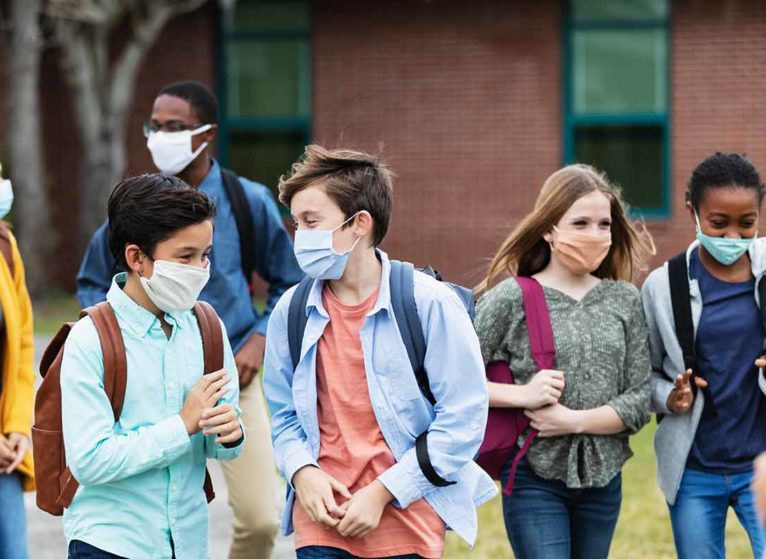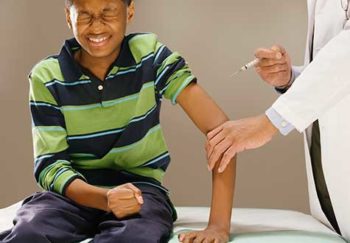This year, Virginia is requiring all rising 7th graders to get both doses of the human papillomavirus (HPV) vaccine.
HPV is, according to the Centers for Disease Control and Prevention, the most common sexually transmitted infection in the U.S. It causes genital warts and several kinds of cancer, including:
- Cervical cancer
- Penile cancer
- Vulvar cancer
- Anal cancer
- Oral cancer
Myths vs. Facts: Is the HPV Vaccine Safe? Does It Work?
Studies indicate that only 55% of the recommended age group — 11-26 — is fully vaccinated against HPV. When pediatrician Susan Werner, MD, talks to parents about it, they voice concerns that getting this vaccine will encourage their kids to have sex.
We talked with Werner and gynecologic oncologist Linda Duska, MD, about common questions and concerns surrounding the HPV vaccine.
The Vaccine Prevents Cancer
Fact. Clinical trials found that Gardasil 9 was almost 100% effective at preventing the types of HPV that cause cancer.
In another study in Australia, where most people are vaccinated, researchers found a 17% decline in precancerous lesions — growths on the cervix that could eventually become cancer — in women ages 25-29.
And even more studies found significant declines in genital wart infections. They’re “not cancer, but still significant,” Duska says. “Genital warts are a horrible thing that people live with. If you have them and you deliver a baby, that baby’s at risk for a condition where they grow warts in their trachea.”
The HPV Vaccine Isn’t Safe
Myth. Researchers reviewed 7,244 reports of post-vaccine safety concerns. Of those, only about 3% were serious. Many of the reports involved common vaccine side effects, such as arm soreness or redness.
The CDC and the U.S. Food & Drug Administration (FDA) have never linked any deaths to the HPV vaccine, Werner says.
She notes that about 5% of vaccine recipients experience dizzy spells or fainting, which, in rare cases, causes injuries. She explains:
- Teens/preteens are more likely have a “fight/flight/freeze reaction” compared to babies and toddlers, which triggers physical symptoms.
- Girls are more likely to faint in general because estrogen dilates their blood vessels.
But providers require vaccine recipients to sit for 15-20 minutes afterward, which greatly reduces the risk of fainting or getting hurt.
And consider this: Gardasil 9, the only HPV vaccine currently available in the U.S., protects against 9 cancer-causing strains of HPV. Every year in our country, about 45,300 people are diagnosed with HPV-associated cancers.
The Vaccine Triggers Allergic Reactions, Including Anaphylaxis
Mostly myth. Werner notes that about 1 in 100,000 people develops hives after vaccines. Anaphylaxis, a severe, potentially life-threatening reaction, can occur, but it’s very rare. Your child shouldn’t get the vaccine if they have:
- A yeast allergy
- An allergy to any ingredient in the vaccine
You Have to Get Three Shots
Partly fact. Kids can begin the HPV vaccine series when they’re 9. They only need two shots if they get the first one before their 15th birthday. If they're 15 or older when they get the first dose, they’ll have to get three.
The vaccine works best when kids get it between ages 9-12, according to the American Cancer Society.
You Can’t Get the Vaccine After Age 26
Myth. The CDC recommends that anyone ages 11-26 get vaccinated, although you can get it as young as 9. But you can get the vaccine through age 45. If you’re 27-45, talk with your healthcare provider about whether it makes sense to get the vaccine.
The HPV Vaccine Encourages Teen Sex
Myth. Werner points to a European study among 12 to 18-year-olds that found, over 30 years, no connection between getting vaccinated and an increase in sexual activity.
But parents also tell her that they’ll wait until their kids are 18 and can make their own decisions. “Well, most people are becoming sexually active in their teens or early 20s,” she says. “I don’t know if everyone realizes that. You don’t want to wait.”
She also hears, “My child is going to wait until marriage to have sex.”
“I tell people you may be confident that your daughter or son is going to be a virgin until marriage, but you can’t be confident about their spouse.”
The Vaccine Injects HPV into You
Myth. Duska says that the HPV vaccine isn’t a living or dead virus. Rather, “it’s a tiny piece of the virus that creates an immune response.”
That immune response produces antibodies that, if you ever encounter HPV, will “bind to the virus and prevent it from infecting cells,” according to the National Cancer Institute.
Boys Don’t Need the Vaccine
Myth. Boys are at risk for:
- Oral cancer
- Penile cancer
- Anal cancer
There’s also no way to screen boys and men for HPV. So, they may unknowingly spread it to their partners.
All of this can be prevented through the HPV vaccine.
Vaccinated Women Don’t Need Cervical Cancer Screening
Myth. The Pap test (also called a Pap smear) detects pre-cancerous cells on the cervix. While the HPV vaccine greatly reduces your risk of cervical cancer, you should still get this test. Here’s why:
- The vaccine protects against most, but not all, cancer-causing HPV strains.
- If you were exposed before you got the vaccine, you could still have HPV.
If You Test Positive for HPV, There’s No Point in Getting the Vaccine
Myth. The vaccine will still protect you against other strains that you haven’t been exposed to.
The Bottom Line: Vaccinate Your Kids
Get the Vaccine for Your Preteen
Still have concerns or questions? Your pediatrician can help.
Duska says that cervical cancer is “almost completely preventable” through vaccination. Yet she sees a new case in an unvaccinated woman almost every week.
“Cervical cancer is an almost completely preventable disease,” she says. “There is no reason why women should have cervical cancer in a developed country. We are failing women in the United States.”
Almost everyone will be exposed to HPV at some point. Many won’t get cancer as a result. Duska says we still don’t understand why some do.
“But what we do know is that this vaccine is incredibly effective,” she says. “And it’s incredibly safe.”


